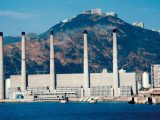People Centred Clean Energy Transitions
September 22, 2021Introduction
As the world seeks to address climate and biodiversity challenges and move to clean energy solutions for example, these will deliver impacts within the workplace. Positive impacts will result in new jobs and opportunities being created within the emerging green economy, but negative impacts will deliver shocks to traditional fossil fuel based industries where jobs will be lost. Net job creation resulting from the shift to clean energy will be positive, but there has to be an honest recognition that impacts on workers and communities will be uneven. The challenge for all is to ensure this transition to a green economy remains people centred and ‘just’, so that no community or workers are ‘left behind’ or is left burdening an unfair share of the costs of this transition.
Transition Shocks
Navigating the pathway to net-zero emissions as part of the new green economy will open significant economic opportunities that will create millions of new jobs in the green technologies and nature based solutions of the future low carbon, regenerative economy. However this transition will deliver shocks both positive and negative. Many of the new job opportunities will require workers to make technical, geographical and skills adjustments in order to bridge the transfer. Indeed, many tradition so called ‘dirty’ jobs will be lost and workers need to be assisted to make this step into the new green economy, and ideally be able to use some of their skill set, learned and applied in the dirty energy sector for example, in the clean energy revolution. Clean energy transitions around the world will have impacts, both large and small, on the lives of billions of people. Some sectors will grow significantly, others will inevitably decline resulting in job losses and the need for supported employment change, early retirement and retraining and relocation. This transition challenge must be proactively addressed, and coordinated by government, in order to ensure the transition to a low-carbon future benefits all our workers and that none are left stranded because of this new direction of travel in our new energy pathway.

People Centred
It is very important that as we listen to the headlines and the talk of targets, climate challenges, green technologies and environmental policies that we remain focussed on what lies at the centre of this change – people. People drive change, and if we are to successfully transition to a new green global economy we must ensure that people are at the centre of all we discuss, develop and deliver. Governments, policy makers and industry must work in cohesion to ensure that the move to clean energy is fair and equitable. Up skilling, retraining and skills enhancement programmes will be critical to help dislocated workers find new employment, and to enable the industries of the new green economy to find qualified employees and deliver the low carbon technologies and solutions required for us to reach net zero by 2050.
A key part of the ‘just transition’ (part of the preamble of the Paris 2015 Climate Agreement), as accepted by governments around the world in the ‘Silesia Declaration’ agreed at COP24 in 2018, is the importance of including workers, communities and people in plans for a just transition. This is the ‘social dialogue’ dimension of the just transition, important for both ensuring the legitimacy of any just transition plan, and also for allowing such co-creating processes to generate solutions based on local knowledge to be integrated into planning and design. And an good example of why this social dialogue and co-creation is important can be see in relation to the backlash that greeted President Macron’s government in France when it imposed a tax on diesel as part of their climate policies. This led to the ‘gillets jaunes’ or ‘yellow vests’ movement which was outraged by both the lack of citizen participation in this carbon tax decision but also that this carbon tax disproportionately and therefore unfairly impact on working class people. This is what happens when we have an ‘unjust transition’ – lack of support from the people.
Jobs Growth
The transition towards net-zero emissions will lead to an overall increase in the energy sector jobs of approximately 9 million globally. The IEA’s Net-Zero Emissions report states that by 2050, an estimated 14 million new jobs are generated in energy supply by 2030 with fossil fuel production losing 5 million positions over the same period. In addition, clean energy industries such as efficiency, automotive and construction are predicted to require a further 16 million workers. This means a total of more than 30 million jobs could be created in the green economy by 2030.
These will be mainly new jobs created as a direct result of the green transition, delivering technology convergence of information technologies with production engineering, advanced manufacturing, creating new innovative, techniques, products and solutions. This transition and convergence will fundamentally transform industry to become smart manufacturing ecosystem and also include new roles for existing workers in construction, in the manufacturing of emissions-reducing products like BEVs and in innovative technologies such as hydrogen. This is nothing short of a new industrial revolution.
Pivoting Skills
However because of the transitions and the geographical impacts of new green technologies new jobs will not always be in the same places or sectors where employment will be lost. Countries, communities and industries that are heavily dependent on fossil energy production, especially coal will see the highest level of job losses giving rise to significant impact on local economies and communities. These impacts and losses can be mitigated through appropriate long-term planning coordinated by the state and national and local levels, and careful navigation of the energy transition route. Reskilling and retraining will ensure that many dislocated workers will find quality employment work in related sectors.
Many workers in traditional energy industries have experience pertinent to drive the transition to clean energy solutions. Offshore oil and gas workers, for example, have the skills foundations required for offshore wind, hydrogen production and low-carbon gas transport.
The energy technology solutions required to reach net zero by 2050 will involve specific geographical and technical deployment. Planning and energy opportunity navigation will ensure that geographical areas and communities that are adversely impacted by the decline of local industries should be specifically targeted for support. Government assistance including research and development initiatives, education, skills training must be linked to decision-making criteria focused on achieving equity and inclusion, delivering high quality and well compensated jobs and still delivering clean energy solutions.
Conclusion
As we tackle the climate crisis and deliver a cleaner, better, brighter we must make our transition beyond a carbon-based and climate destabilising unsustainable economic-energy model a citizen centred transition. Transitioning to net zero will mean disruption, and that there will be costs and losers as well as winners and long term benefits, but planning the route, navigating with care, delivering commensurate benefits from the opportunities will help avoid negative social impact on our journey. As the old saying has it: ‘If you fail to plan, you are planning to fail’.
Transitioning to net zero and developing a green economy presents an opportunity for economies to grow post the COVID-19 pandemic, to reinvent themselves and to develop specialised high value economies. To ‘build back better’ we need to ‘build back green’. However the change required will be powered by a just transition, one where quality, well paid and secure work for people is the vital link in the chain for consistent, substantive progress in decarbonising our energy systems and the wider economy.
Making sure the energy world benefits all people can help advance human and economic development goals, especially in emerging and developing economies, and is critical for increasing public acceptance and support of energy transitions. A just transition has the capacity to communicate, mobilise and enthuse our communities and citizens, so that we embark on the energy transition as if we are living and working in the early days of a better society.
Authors
![]() Paul McCormack, GenComm
Paul McCormack, GenComm
![]() Professor of Green Political Economy Queen’s University Belfast. Co-Director of the Centre
Professor of Green Political Economy Queen’s University Belfast. Co-Director of the Centre
for Sustainability, Equality and Climate Action, Co-Chair Belfast Climate Commission



 With over 15 years of reporting hydrogen news, we are your premier source for the latest updates and insights in hydrogen and renewable energy.
With over 15 years of reporting hydrogen news, we are your premier source for the latest updates and insights in hydrogen and renewable energy.